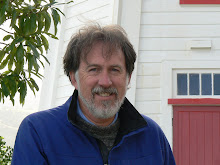Darryl Sabin, Joe Mullen and Dad
Yesterday on the New Zealand One television channel a brief feature was aired about the tragic injury and astonishing recovery a young man named Darryl Sabin. Darryl sustained a severe traumatic brain injury while playing rugby. For some time his survival and then later, any meaningful recovery was in doubt. But the combination of skilled medical care, intensive physiotherapy, community support, unrelenting family love and involvement and most importantly his sheer will to live, resulted in Darryl’s gradual ability to regain speech and mobility.
Even though his injury occurred during a rugby match, Darrell has turned to that very sport for further inspiration. And that sport has in turn supported him to the extent that the coach and players of the New Zealand national rugby team, the All Blacks, have given him a seat with the team on the sidelines on the injury bench. It turns out that he has been as much an inspiration to his heros and they have been to him. As a physician and a human being I found the story of Darryl’s will to survive to be truly inspiring. Equally inspirational was the extent to which his family, community and society supported him.
I guess I’m always attracted to a story like this because my life too was strongly influenced by an equally tenacious and inspirational person with an equally amazing tale of recovery: my father. In August of 1954 the United States was swept by yet another wave of poliomyelitis, the dreaded summer killer. My father, 33 years old at the time, was unfortunate enough to contract this disease literally months before an effective vaccine was available to the populace. At the time I was 18 months old and my brother was 3 1/2.
At first my father was in a coma. Several days later he awoke in an iron lung with quadriplegia. At this point medical team at Cook County Hospital in Chicago was unsure if there was much hope of progress and they were not optimistic about his long term prognosis. To hear my father talk about it, however, he insisted that he knew even then that paralysis was simply not an option. In the ensuing weeks he regained most of the use of his upper extremities and was able to breathe on his own. But he still remained paraplegic.
He was then selected for a research program which was to incorporate intensive physical therapy in an effort to rehabilitate patients who were considered “older” victims of disease. For the next year we drove back and forth to Illinois Research Hospital (which later became University of Illinois -- Chicago) for daily physical therapy, mosty in the pool. Dad frequently said that Boot Camp in the Army during World War II was a cakewalk compared to the rigors of his rehab. And I don’t think I ever saw him get in a swimming pool in all the years afterward. But within a year he was able to walk again without braces or crutches, his disability betrayed only by a pronounced limp and a markedly atrophic leg.
And how did we fare financially and socially as a family? As it turns out, my father had been hired by a specialty steel company in Chicago Heights, Illinois, as a promising metallurgical engineer who had recently used the G.I. Bill to finish his studies at Case Institute of Technology (now Case Western Reserve) in Cleveland Ohio. As difficult as it is to believe when viewed from a 21st-century US perspective, my father’s employment with that firm was never interrupted and he never missed a paycheck. His boss, a man named Joe Mullen, whose name I’ve heard spoken reverentially but who I never personally met, insisted that our family be supported during this health crisis. There was no disability policy, no social health network. There was only the decision of one man to do something compassionate and vital.
To me, this is a reflection of an entirely different set of corporate ethics and a level of humanitarian engagement that simply would never occur today. Had something like this happened to us in contemporary America, I would have grown up in poverty. The Joe Mullens of that era were part of an entirely different corporate culture. Rather than blindly and obsessively pursuing a so-called fiduciary responsibility to maximize profit for abstract shareholders and investment entities, this corporation still had a human face.
Of course, there are other social entities that can mitigate risk and invest in human outcomes. The story of Darryl Sabin is an example of how societies can be organized to take care of the less fortunate. In New Zealand, the social infrastructure still exists to allow for happy endings. Unlike the America my father knew, it is almost certain that today in the USA, such a positive outcome would be far less likely for many and unimaginable for many more.
This is not a foregone conclusion.It is the logical extension of the misguided policies that relegate caring for people and families to faceless corporate entities. Nothing short of the wholesale reorganization of the health system in the United States will allow us to reliably care for those in such situations, without subjecting them to unbearable social stress and financial hardship or ruin. As I have said before, as a nation we have the treasure, the talent and knowledge. It is ultimately a question of moral courage and political will. Unless we change, there will be fewer and fewer happy endings.


No comments:
Post a Comment